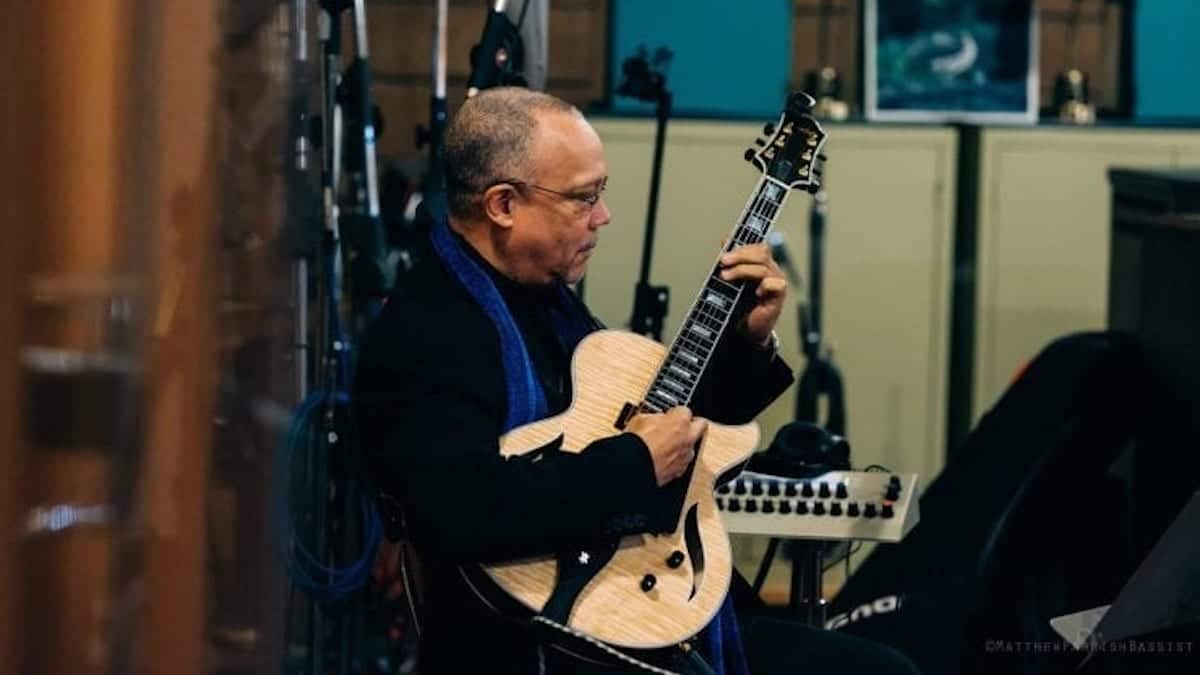Artist Features
Rodney Jones: The Art of Jazz & The Craft of Guitar

“It is important to practice and develop the Art of Jazz and the Craft of the Guitar.” Rodney Jones
JGT: Rodney on ‘The Art of Jazz’
There are some amazing jazz musicians who are not guitar masters but who’s music transcends their instrument. The music comes first. When the music that is played is a genuine expression of the human spirit and enlivened by an inner connection to Soul, the result is magical and offers deep moments of connection between the artist and the listener. The listener is able to recognize themselves and their journey in the story that the artist shares through sound. The truer and deeper this connection to their deepest self, the more powerful and transforming is the music offered. The music and the moment
Being willing to play the notes that “want to be played” is a higher expression than playing the “notes that can be played”. It takes humility and maturity to let the music shine more than the instrument shines. The development of the Art of Jazz requires steady and
Listen to the ‘Masters’ of the music
Listen to Charlie Parker one thousand times, and John Coltrane, Miles Davis, Thelonious Monk, Duke Ellington, Bill Evans, Herbie Hancock, Wes Montgomery, Kenny Burrell, Bucky Pizzarelli, Barney Kessel, Grant Green, George Benson and countless
Practice Music
If you want to play music, you must practice music. Rather than spend countless hours with exercises that are not sources of musical inspiration, spend time playing tunes, soloing as you would in performance. Practicing the way that you want to play will make the transition from the woodshed to the bandstand all the easier. It will eliminate the common experience of playing so much better at home than on the bandstand. You become what you practice most. If you want to play music on the bandstand, you should practice music. If you want to play exercises on the bandstand, then you should practice exercises. Water the plant that you want to grow!
Rinse and Repeat
My experience is that most guitarists do not practice enough, or they do not practice in a focused way with intention.
JGT: Rodney on ‘The Craft of the Guitar‘
The guitar is hard to master. Period! The End! To really master the guitar it is going to take some work and some effort – a lot of work and effort.
- You must work on your picking. Whether you use alternate, sweep, economy, legato, thumb, fingerstyle, or hybrid picking. You must work on it. Consistent effort and practice will yield consistent results.
- You must work on your sound. Does your guitar sound the way that you would like it to sound? This is one of the first steps to consider. Spend some time with the guitar, your left and right hands, the amp sound, the strings that you use. Do all of these add up to what you like to hear? Show your sound, your tone, some love.
- Get your sight-reading together but not so together that it messes up your playing. The notes are not on the paper. The notes are in the air when you play them. Read the notes and them bring them to life. Play them with feeling and intention and connect them to your heart. Great readers do this and you cannot tell they are reading!
- Practice playing with other musicians. This will allow you to work on listening to the music around you as well as develop your comping skills and
leaning how to interactto the musicin the moment.
JGT: You have taught for many years at The Juilliard School and The Manhattan School of Music. Does jazz education really work? What have you learned?
Rodney: Teaching at Juilliard and The Manhattan School of Music was a wonderful experience. I got to hear, and share, with some of the finest young jazz musicians in the world. In virtually every case, those students who excelled and really grew as
Jazz education works and it works whether you are in school or self taught. Commitment, effort, repetition, and love make all the difference in the result. The best students don’t just “go through things”, they “grow through things”. This attitude, and perseverance, and learning is usually the determining factor in how much and how soon a musician will grow.
NEXT – Rodney’s Guitar and Equipment Picks >>>
-
Jazz Guitar Lessons2 weeks ago
New JGT Guitar Lesson: Analyzing “Without A Song”
-
Jazz Guitar Lessons4 weeks ago
New JGT Guitar Lesson: Considering “Falling Grace”
-
Artist Features1 week ago
New Kurt Rosenwinkel JGT Video Podcast – July 2024
-
Artist Features2 weeks ago
JGT Talks To Seattle’s Michael Eskenazi



















